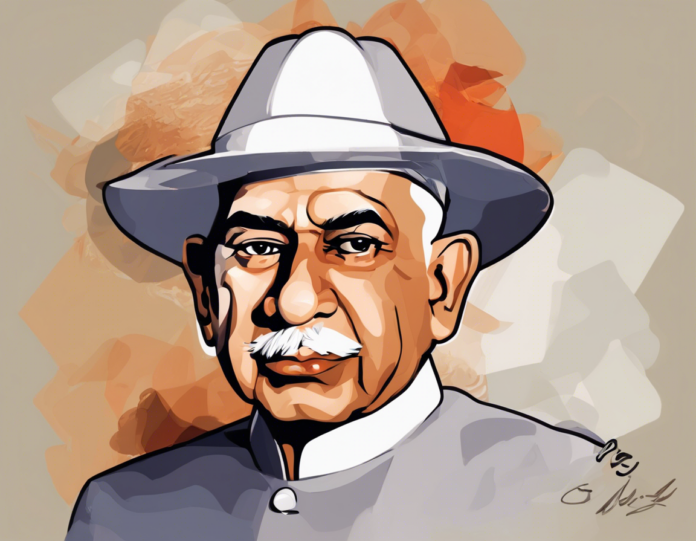Introduction
Chaudhary Charan Singh, a prominent figure in Indian politics, is widely regarded as a champion of farmers’ rights and a leader who upheld the interests of the rural populace. Born on December 23, 1902, in a small village in Uttar Pradesh, Charan Singh’s political journey was marked by a steadfast commitment to social justice, agricultural reforms, and empowerment of the marginalized sections of society. As the fifth Prime Minister of India, he left an indelible mark on the country’s political landscape.
Early Life and Political Journey
Charan Singh’s early life was shaped by the agrarian struggles that he witnessed in rural India. This upbringing instilled in him a deep sense of empathy for the farmers and a determination to improve their living conditions. His foray into politics began in the 1930s when he joined the Indian National Congress and actively participated in the freedom movement. However, his disillusionment with the Congress’s policies towards farmers led him to break away and form his own political party, the Bharatiya Kranti Dal.
Advocate for Farmers’ Rights
One of Charan Singh’s most enduring legacies is his unwavering commitment to championing the cause of farmers. He believed that agriculture formed the backbone of India’s economy and that farmers were the country’s true wealth creators. As a political leader, he fought tirelessly for the implementation of policies that would protect farmers from exploitation and ensure their economic well-being. His famous slogan, “Jai Jawan, Jai Kisan,” encapsulated his belief in the equal importance of soldiers and farmers in nation-building.
Key Reforms and Policy Initiatives
During his tenure as Prime Minister from 1979 to 1980, Charan Singh initiated several key reforms aimed at empowering farmers and addressing rural poverty. The Agricultural Prices Commission, set up under his leadership, aimed to ensure fair prices for agricultural produce and protect farmers from market fluctuations. He also introduced the Zamindari Abolition Act, which sought to dismantle the feudal landowning system and redistribute land to the tillers.
Legacy and Impact
Charan Singh’s legacy continues to resonate in Indian politics and society. His emphasis on agrarian reforms and farmers’ rights laid the foundation for future agricultural policies in the country. The Charan Singh Haryana Agricultural University and the Chaudhary Charan Singh National Institute of Agricultural Marketing stand as testaments to his enduring influence in the agricultural sector. His advocacy for social justice and empowerment of the rural poor has inspired generations of politicians and activists to continue his work.
Challenges and Controversies
Despite his contributions to Indian politics, Charan Singh’s tenure as Prime Minister was marred by challenges and controversies. His coalition government faced internal strife and opposition from various quarters, leading to its premature downfall. Critics also point to his handling of economic reforms and governance issues as areas of concern. However, his supporters argue that he laid the groundwork for future leaders to build upon and that his heart was always in the right place, working for the welfare of the common man.
FAQs
1. What were Charan Singh’s main contributions to Indian agriculture?
Charan Singh’s main contributions to Indian agriculture include advocating for farmers’ rights, introducing policies to protect them from exploitation, and initiating key reforms such as the Agricultural Prices Commission and the Zamindari Abolition Act.
2. How did Charan Singh impact rural India?
Charan Singh’s impact on rural India was significant, as he worked towards empowering farmers, addressing rural poverty, and dismantling feudal landowning systems. His policies aimed to improve the lives of the rural poor and ensure their economic well-being.
3. What is the significance of the slogan “Jai Jawan, Jai Kisan” coined by Charan Singh?
The slogan “Jai Jawan, Jai Kisan” signifies the equal importance of soldiers and farmers in nation-building. Charan Singh used this slogan to emphasize the vital role that farmers play in sustaining the country’s economy and food security.
4. How is Charan Singh remembered in Indian politics today?
Charan Singh is remembered in Indian politics as a visionary leader who championed the cause of farmers and fought for social justice. His legacy continues to inspire politicians and activists to work towards the welfare of the rural populace.
5. What were the key challenges faced by Charan Singh during his tenure as Prime Minister?
Some of the key challenges faced by Charan Singh during his tenure as Prime Minister included internal strife within his coalition government, opposition from various quarters, and criticism of his handling of economic reforms and governance issues.


Recent comments